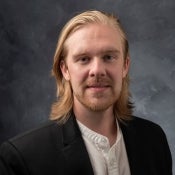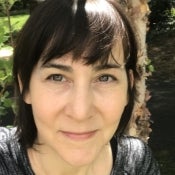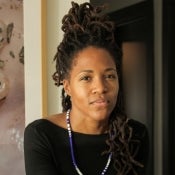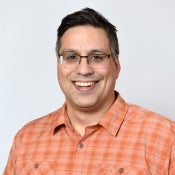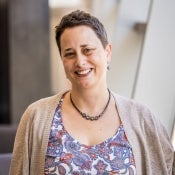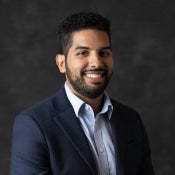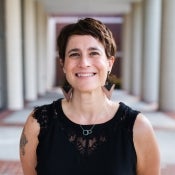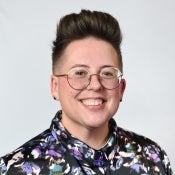10 new faculty join ASU’s Department of English

Ross-Blakley Hall on the Tempe campus is the home of the Department of English. Photo by HDF/Dan Schwalm
As fall 2024 swelters its way into September, several faculty members in the Department of English at Arizona State University are settling into their new routines and environs.
Specialists in education, film, literature and writing — academic, professional and creative — are joining the largest humanities unit in The College of Liberal Arts and Sciences, recently recognized by U.S. News and World Report for its robust career development programs.
These accomplished teachers, scholars and artists arrive at a moment of reflection for the department, as it launches new curricula, welcomes new leadership and celebrates its long institutional history (125 years as a Department of English).
“As a new faculty member here myself,” said Manushag Powell, chair of the Department of English, “I have the best of both worlds: a fantastic cohort to come in with, and the chair’s pleasure of seeing how my new home department is strengthened by the wisdom and skills these folks bring with them, and all they offer to our community.”
Let’s meet some of these rising stars of the humanities at ASU: Josh Coleman, Cheryl Greene, Saretta Morgan, Derek Pacheco, Manushag “Nush” Powell, Eduardo Ramos, Christian Ravela, Angela Rounsaville, Jed Samer and Cecilia Savala.
Josh Coleman, assistant professor, English education
Coleman uses social science and humanities-based methods to study LGBTQ+ youth literature and educator well-being. His research on teacher resistance to classroom censorship — the “Banned Childhoods” project — is funded by the National Academy of Education (NAEd)/Spencer Postdoctoral Fellowship.
Coleman is co-author of “Restorying Young Adult Literature: Expanding Students’ Perspectives with Digital Texts” (NCTE, 2023). He holds a PhD in literacy, culture and international education and a master's degree in English literature from the University of Pennsylvania, as well as a Master of Arts (MFA) in teaching in secondary English education from the University of North Carolina.
Cheryl Greene, assistant teaching professor, ASU Writing Programs
Greene writes and speaks on issues of gender violence in media and culture. In 2023, she presented a paper on women's documentary films at the Doing Women’s Film and TV History VI conference, University of Sussex, UK. In 2024, Greene was accepted to present as part of a group for CCCC's conference “Designing, Adapting, Developing, Assessing: Teaching for Transfer & Flexible Reflection” in Spokane, Washington. She is currently teaching ENG 101 and 302, and her courses touch on themes from food politics to the rhetoric of podcasts.
Greene completed her doctoral studies at ASU in English (rhetoric/composition and linguistics) with a concentration in visual rhetoric. She also has a master's degree in American studies with a focus on the Southwest from the University of New Mexico.
Saretta Morgan, visiting writer, Center for Imagination in the Borderlands
Morgan is the author of the poetry collection “Alt-Nature” (Coffee House Press, 2024) and the chapbooks “Feeling Upon Arrival” (Ugly Duckling, 2018) and “Room for a Counter Interior” (Portable Press at Yo-Yo Labs, 2017).
She has received support from the Jerome Foundation, Arizona Commission on the Arts, Tucson MoCA, Tamaas Cross Cultural Organization, Virginia G. Piper Center for Creative Writing and elsewhere. She has been an artist-in-residence at the Lower Manhattan Cultural Council, Headlands Center for the Arts, the Center for African American Poetry and Poetics, and Oak Spring Garden Foundation. She earned her Master of Fine Arts in creative writing from Pratt Institute in New York.
Derek Pacheco, associate professor, literature
Pacheco’s research specializes in antebellum American literature, romanticism and children’s literature. He is the author of “Moral Enterprise: Literature and Education in Antebellum America” (Ohio State University Press, 2013), and he also publishes regularly on Nathaniel Hawthorne.
Pacheco holds two graduate degrees in English literature: a PhD from the University of California, Los Angeles and a master's degree from the University of Washington.
Manushag “Nush” Powell, chair and professor, literature
Powell is a literary historian and public scholar most recently at Purdue University. Powell studies 18th-century British literature and culture, including publishing, women’s periodicals and piracy narratives. She is the author or editor of four books and the instructor of the Wondrium “The Real History of Pirates” course. Her essay on pirates and hook prosthetics recently appeared in the Digital Defoe journal.
Powell holds both a PhD and master's degree in English literature from the University of California, Los Angeles.
Eduardo Ramos, assistant professor, literature
Previously a postdoctoral research scholar at the Arizona Center for Medieval and Renaissance Studies, Ramos specializes in medieval English and Icelandic literature with a focus on cross-cultural contact and depictions of race. Ramos’s work has appeared in the journals Speculum, Literature Compass, Postmedieval and Comitatus, and the collection “What is North?” (Brepols, 2020).
Ramos holds a PhD and master's degree in English from Pennsylvania State University and a master's degree in medieval Icelandic studies from the University of Iceland.
Christian Ravela, assistant professor, literature
Ravela is the former director of the humanities and cultural studies program at the University of Central Florida. He specializes in 20th-century U.S. multiethnic literature, comparative ethnic studies and critical theory, and is at work on the monograph “Interethnic Worldliness: Multiethnic Bildungsromans and the Negative Dialectic of Race.”
He holds both a PhD and master's degree in English from the University of Washington.
Angela Rounsaville, associate professor, writing, rhetorics and literacies
Having previously been at the University of Central Florida, where she served as director of their award-winning writing program, Rounsaville is a literacy researcher who explores writers and writing conditions in the swirl of globalization and transnational movements. She is the co-author of “Writing Knowledge Transfer: Theory, Research, Pedagogy” (Parlor Press, 2023).
Rounsaville’s graduate degrees are both in English: a PhD from the University of Washington and a master's degree from the University of Colorado Boulder.
Jed Samer, associate professor, film and media studies
Also a remix artist and documentary filmmaker, Samer is a cultural studies scholar of feminist, queer and trans media. They are the author of “Lesbian Potentiality and Feminist Media in the 1970s” (Duke University Press, 2022) and co-editor of “Su Friedrich: Interviews” (University Press of Mississippi, 2022).
They hold a PhD in critical studies from the School of Cinematic Arts and a graduate certificate in gender studies from the Dornsife College of Letters, Arts, and Sciences — both at the University of Southern California — and a master's degree in humanities from the University of Chicago.
Cecilia Savala, clinical assistant professor, Virginia G. Piper Center for Creative Writing
Savala joins the Department of English as the Piper Fellow-in-Residence. A 2024 graduate of ASU’s MFA in creative writing program, Savala is a poet and editor; she’ll teach poetry workshops for ASU’s creative writing program and will manage the Piper Center’s Thousand Languages translation project.
Her work can be found in Red Ogre Review, The Boiler, and Poetry South, among others. Her first collection, “How to Be a Girl,” was a finalist for the 2024 Trio Award for First or Second Books.
About the Department of English
The Department of English has six distinct areas of study — creative writing; film and media studies; linguistics and applied linguistics; literature; secondary English education; and writing, rhetorics and literacies — in addition to the nation’s first cross-humanities undergraduate degree in culture, technology and environment, and a new concentration in narrative studies.
The department also administers the university’s Writing Programs, which delivers writing instruction to increasing numbers of undergraduates each year. As of fall 2024, there are 11,000 in the program’s courses, according to enrollment projections.
More Arts, humanities and education

2 ASU professors, alumnus named 2025 Guggenheim Fellows
Two Arizona State University professors and a university alumnus have been named 2025 Guggenheim Fellows.Regents Professor Sir Jonathan Bate, English Professor of Practice Larissa Fasthorse and…

No argument: ASU-led project improves high school students' writing skills
Students in the freshman English class at Phoenix Trevor G. Browne High School often pop the question to teacher Rocio Rivas.No, not that one.This one:“How is this going to help me?”When Rivas…

ASU instructor’s debut novel becomes a bestseller on Amazon
Desiree Prieto Groft’s newly released novel "Girl, Unemployed" focuses on women and work — a subject close to Groft’s heart.“I have always been obsessed with women and jobs,” said Groft, a writing…


